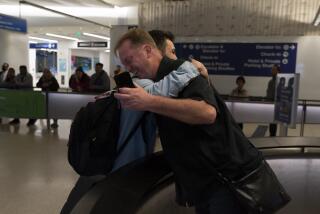Released Hostage Treated Well; but ‘No Substitute for Freedom’ : Professor Says He Grieves for Those Still Held
- Share via
DAMASCUS, Syria — Indian professor Mithileshwar Singh said today that his kidnapers treated him well during 20 months as a hostage in Lebanon but that “there is no substitute for freedom” and he grieves for those still held.
His release Monday leaves nine Americans and seven other foreigners still in the hands of extremist Muslim kidnapers in Lebanon. Held longest is Terry A. Anderson, chief Middle East correspondent of the Associated Press, who was abducted March 16, 1985.
Singh, 60, who has resident alien status in the United States, was reunited with his wife, Lalmani, at the U.S. Embassy this afternoon. He was freed Monday night in Beirut and driven to Damascus by Syrian army officers, then turned over to U.S. Ambassador Edward Djerjian.
A special U.S. Air Force plane arrived to take him to an American military hospital in Wiesbaden, West Germany, for a medical checkup.
‘Feeling Relatively Well’
Djerjian said that Singh asked to be allowed to rest and that, “given the circumstances, he is feeling relatively well.” A Syrian doctor pronounced him fit to travel.
Armed men dressed as policemen took Singh hostage Jan. 24, 1987, on the Beirut University College campus in West Beirut, along with Americans Alann Steen, Robert Polhill and Jesse Turner.
A group calling itself Islamic Jihad for the Liberation of Palestine claimed responsibility, and said it freed Singh as a good-will gesture to the United States.
A U.S. official in Damascus said the Americans decided to accept custody because Singh had applied for citizenship before his abduction.
Singh said today that he felt “wonderful” and added: “Thank God I’m free, but I’m very sorry that my colleagues and friends are still in captivity. I hope they’ll be free soon.”
Supplied With Medicine
He was clean-shaven and dressed in a gray suit when he appeared before dozens of reporters at the Syrian Foreign Ministry after a brief chat with Djerjian.
Steen, Polhill and Turner were the only hostages he saw while in captivity, Singh said.
Asked about the conditions under which he was held, he said: “The treatment was better than I had expected, but there’s no substitute for freedom in this world.”
His captors provided medicine for his chronic diabetes, Singh said, but he appeared hesitant about discussing details of his captivity.
After a few questions, he said: “Please. I’m very tired now. . . . Respect my feeling of freedom.”
Djerjian thanked Syria, the main power broker in Lebanon where it has deployed about 25,000 troops, for playing an important part in the release of Singh.
“For too long the hostages--these innocent persons--have been pawns in an inhuman and cruel political game of terrorism,” he said.
More to Read
Sign up for Essential California
The most important California stories and recommendations in your inbox every morning.
You may occasionally receive promotional content from the Los Angeles Times.













